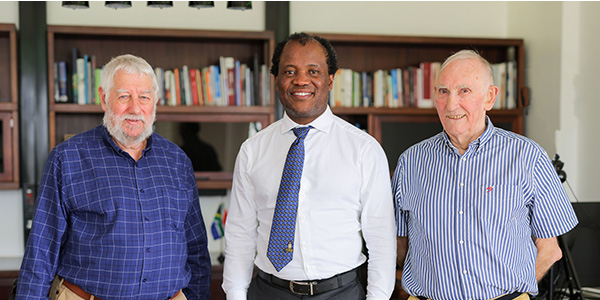Three Royal Fellows Reunite at Wits
- Wits University
It was the meeting of three great intellectuals, all Fellows of the Royal Society (UK), all scientists, and all fellow Witsies.

A cursory search of the Royal Society (UK)’s database reveals that the greatest number of Royal Society Fellows in Africa emanated from Wits University. This includes staff and graduates, some of whom have sadly passed on.
However, on 27 March, it was the meeting of three great intellectuals, all Fellows of the Royal Society (UK), all scientists, and all fellow Witsies.
Professor Zeblon Vilakazi (FRS), the Vice-Chancellor and Principal of Wits University, hosted Distinguished Wits Professor Roger Sheldon (FRS), known as the father of green chemistry and catalysis, and Professor Graham Hutchings (FRS), a former Wits staff member, who is renowned for his work in heterogeneous catalysis.
“It was a pleasure to indulge in conversation with two world-renowned chemists,” says Vilakazi, himself a nuclear physicist. “The work that they undertake extends well beyond the laboratory – their work has multiple applications and impacts positively on society in so many ways.
Sheldon is a recognised authority on green chemistry and renowned as a founding father of this field – he developed the E factor for assessing the environmental impact of chemical processes. His research interests are in green chemistry, catalysis, and enzyme immobilisation. He is also Professor Emeritus of Biocatalysis and Organic Chemistry at the Delft University of Technology.
“Everything we use, we borrow from future generations. We must put it back as we have received it,” says Sheldon who was elected as a Fellow of the Royal Society in 2015. “Natural resources should be used at rates that do not unacceptably deplete supply over the long-term. We are using fossil fuels much faster than the rate at which they are being generated and we are generating carbon dioxide at a rate that can’t be assimilated by the environment, and that is leading to climate change.”
Hutchings pioneered the use of gold as a remarkable catalyst. His research assisted the chemical industry to protect the environment as gold catalysts permit cleaner reactions with fewer by-products. His research has extended the range of reactions that can be catalysed by gold nanoparticles, such as the oxidation of primary alcohols to aldehydes using a gold–palladium/titanium dioxide combination, without the need for a solvent. He has received a number of honours throughout his career, including awards for green chemistry and sustainability. He has held three academic chairs at Wits, Liverpool, and Cardiff where he has reshaped his research in new fields of heterogeneous catalysis using multidisciplinary approaches.
Hutchings said: “It is a real pleasure to return to Wits, an institution I see as my first academic home. Our discussions were based on the role Wits and southern Africa can play as leader in using sustainable energy effectively for the benefit of society as whole.”
Vilakazi, a nuclear physicist, was elected as a Fellow of the Royal Society and was inducted into the Royal Society in 2022. He was instrumental in establishing South Africa's first experimental high-energy physics research group focusing on development of the High-level Trigger for the CERN-ALICE experiment at the Large Hadron Collider. He served as a visiting scientist at the Atomic Energy Commission and Alternative Energy in Saclay, France, amongst other appointments.
Wits Royal Society Fellows
The three scientists join the ranks of Sir David King and Professors Bernard Fanaroff, David Epstein, Peter Sarnak, John Burland, and David Mayne, all of whom are Witsies.
They follow in the footsteps of nine other Witsies, who in their lifetime were elected as Fellows of one of the world’s most prestigious scientific academies: Professors Robert Broom, Phillip Tobias, David Pettifor, Lewis Wolpert, Frank Nabarro, Henry Selby Hele-Shaw, Sir Basil Schonland, and Nobel prize-winners Sir Sydney Brenner and Sir Aaron Klug.
Other prominent South African Royal Fellows include Professors Michael Thackeray, William Bond, Salim Abdool Karim and George Ellis. Prominent Fellows of the Royal Society included Isaac Newton, Charles Darwin, Albert Einstein, and Stephen Hawking, amongst others.
A Royal Honour
Being elected as a Fellow of the Royal Society (UK) is prestigious, given that there are only about 1 700 current Fellows and Foreign Members of the Royal Society, and only 8 000 Fellows since its inception in 1660, including around 85 Nobel Laureates. The Royal Society is an independent scientific academy of the UK, dedicated to promoting excellence in science for the benefit of humanity.

